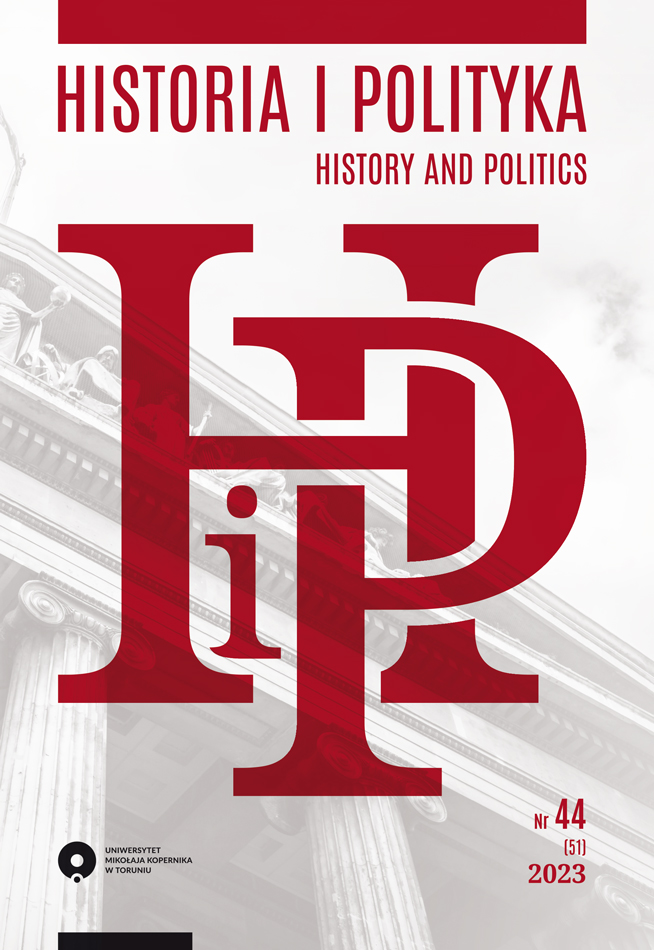Causes and Effects of the Economic Crisis in the Federal Republic of Germany in 1957–1958
DOI:
https://doi.org/10.12775/HiP.2023.016Keywords
German economy, German economy miracle, economic development, buisness cycle, economic crisisAbstract
The economic crisis of 1957–1958 brought to an end the first and started the second post-war business cycle in the West Germany’s economy. The long-term growth trend of the 1958–1970 period was interlaced with two downturns in the economic development, in the 1962–1963 and 1965–1967 periods, respectively. As in the entire period following the World War II, the downturn in economic activity did not lead to an absolute decline in industrial production and gross domestic product (GDP) on the year to year basis, but only to a reduction in the economic growth rate, or in other words – negative deviation of the growth rate from the long-term development trend.
References
Abelshauser, W. (1977). Die Rekonstruktion der Westdeutschen Wirtschaft und die Rolle der Besatzungspolitik. In: C. Scharf, & H.J. Schröder (Eds.). Politische und ökonomische Stabilisierung Westdeutschlands 1945–1949 (pp. 1–17). Wiesbaden: Franz Steiner Verlag.
Blum, R. (1969). Soziale Marktwirtschaf. Wirtschaftspolitik zwischen Neoliberalismus und Ordoliberalismus. Tübingen: J.C.B. Mohr (Paul Siebeck).
Bottiger, H. (1992). Die Finanzpolitik wahrend des deutschen. Wirtschaftswiunders ERINA-Studie, Oktober.
Der Aussenhandel der Bundesrepublik Deutschland. Part 1. (1957). Deutschland/Bundesrepublik. Statistisches Bundesamt (Wiesbaden). Bonn: BMW.
Der Volkswirt. (1958). February 15.
Der Volkswirt. (1958a). March 15.
Der Volkswirt. (1959). July 15.
Deutsches Geld- und Bankwesen in Zahlen 1876–1975. (1977). Deutsche Bundesbank. Frankfurt am Main: Fritz Knapp.
Die Welt. (1958). February 11.
Economic Bulletin for Europe. (1957). Vol. 19. Geneva: United Nations, Economic Commission for Europe.
Economic Bulletin for Europe. (1957a). Vol. 20. Geneva: United Nations, Economic Commission for Europe.
Gedymin, O. (2002). Kapitalizm niemiecki. Szkice o genezie, rozwoju i teraźniejszości. Białystok: Wydawnictwo WSFiZ.
Grimm, K. (1992). Socjalna gospodarka rynkowa w RFN. Koncepcja, rozwój, problematyka. Warszawa: Fundacja im. F. Eberta.
Hensel, K.P. (1977). Wirtschaftsordnungen – Staatsordnungen. In: H. Hammel (Ed.). Systemvergleich als Aufgabe. Aufsätze und Vorträge. Stuttgart–New York: Gustav Fischer Verlag.
Monatsberichte der Deutschen Bundesbank. (1958, February). Frankfurt am Main: DBB.
Müller-Armack, A. (1966). Wirtschaftsordnung und Wirtschaftspolitik. Studien und Konzepte zur Sozialen Marktwirtschaft und zur Europäischen Integration. Freiburg im Breisgau: Verlag Rombach.
Neue Rhein-Zeitung. (1958). February 20.
Nowak, Z. (1960). Zarys czynników rozwoju gospodarczego Niemiec Zachodnich. Poznań: Instytut Zachodni.
Nürnberger Nachrichten. (1958). July 5.
Sachverständigenrat zur Begutachtung der gesamtwirtschaftlichen Entwicklung. (1968). Alternativen Aussenvirtschaftlicher Anpassung. Jahresgutachten [Annual Report], No. 1968/1969. Stuttgart, Mainz: Verlag W. Kohlhammer.
Scheel, W. (1965). Aktuelle Probleme der Entwicklungspolitik. Kiel: Institut für Weltwirtschaft.
Schiller, K. (1966). Preisstabilität durch globale Steuerung der Marktwirtschaft. Tübingen: J.C.B. Mohr, Walter Eucken Institut.
Schlecht, O. (1988). Die Genesis des Konzepts der Sozialen Marktwirtschaft. In: O. Issing (Ed.). Grundtexte zur Sozialen Marktwirtschaft. Vol. 2: Das Soziale in der Sozialen Marktwirtschaft (pp. 131–145). Stuttgart, New York: Gustav Fischer Verlag.
Stucken, R. (1953). Deutsche Geld- und Kreditpolitik 1944–53. Tübingen: J.C.B. Mohr.
Sziotka, B. (1976). Kontrasty społeczno-ekonomiczne Republiki Federalnej Niemiec. Cykle koniunkturalne lat 1950–1974. Katowice: Wydawnictwo „Śląsk”.
Wagner, A. (1972). Die Wachstumszyklen in der Bundesrepublik Deutschland. Eine komparativ-dynamische Komponentenanalyse fuer die Jahre 1951–1970. Tübingen: J.C.B. Mohr.
Wirtschaft und Statistik. (1958). Heft 1.
Wirtschaft und Statistik. (1958a). Heft 2.
Wirtschat und Statistik. (1959). Heft 2.
Wochenbericht. (1959). Vol. 8. Deutsches Institut für Wirtschaftsforschung.
Zagóra-Jonszta, U. (1999). Ordoliberalizm a społeczna gospodarka rynkowa Niemiec. Możliwości jej realizacji w Polsce. Katowice: Wydawnictwo Uczelniane Akademii Ekonomicznej im. Karola Adamieckiego.
Downloads
Published
How to Cite
Issue
Section
License
Copyright (c) 2023 Zbigniew Klimiuk

This work is licensed under a Creative Commons Attribution-NoDerivatives 4.0 International License.
Nicolaus Copernicus University fully respects the right to privacy and protection of personal data of all authors. The authors’ personal data is not used for commercial and/or marketing purposes.Stats
Number of views and downloads: 276
Number of citations: 0



